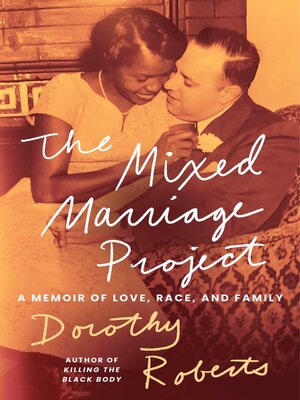
Sign up to save your library
With an OverDrive account, you can save your favorite libraries for at-a-glance information about availability. Find out more about OverDrive accounts.
Find this title in Libby, the library reading app by OverDrive.



Search for a digital library with this title
Title found at these libraries:
| Library Name | Distance |
|---|---|
| Loading... |
From Dorothy Roberts, author of Killing the Black Body and a writer who "has brilliantly illuminated the Black experience in America for decades" (Bryan Stevenson), comes a spirited and riveting memoir of growing up in an interracial family in 1960s Chicago and a daughter's journey to understand her parents' marriage—and her own identity.
Dorothy Roberts grew up in a deeply segregated Chicago of the 1960s where relationships barely crossed the "colorline." Yet inside her own home, where her father was white and her mother a Black Jamaican immigrant, interracial marriage wasn't just a part of her upbringing, it was a shared mission. Her father, an anthropologist, spent her entire childhood working on a book about Black-white marriages—a project he never finished but shaped every aspect of their family life.
As a 21-year-old graduate student, Dorothy's father dedicated himself to the study of interracial marriage and her mother soon became his full-time partner in that work. Together over the years they interviewed over 500 couples and assembled stunning stories about interracial marriages that took place as early as the 1880s—studying, but also living, championing, and believing in their power to advance social equality.
Decades later, while sorting through her father's papers, Roberts uncovers a truth that upends everything she thought she knew about her family: her father's research didn't begin with her parents' love story—it came long before it. This discovery forces her to wrestle with her father's intentions, her own views about interracial relationships, and where she fits in that story. Rather than finish the book her father never published, Roberts immerses herself in their archive of interviews to trace the story of her parents and to better understand her own.
Though grounded in her parents' research, it's Roberts' captivating storytelling that drives this memoir. In following the arc of her parents' interviews and marriage, The Mixed Marriage Project invites us into the everyday lives of interracial couples in Chicago over four decades. Along the way, Roberts reflects on her own childhood as a Black girl with a white father, and how those experiences shaped her into one of today's most prominent public thinkers and scholars on race. Blurring the boundaries between the political and the personal, between memoir and history, The Mixed Marriage Project is a deeply moving meditation on family, race, identity, and love.
Dorothy Roberts grew up in a deeply segregated Chicago of the 1960s where relationships barely crossed the "colorline." Yet inside her own home, where her father was white and her mother a Black Jamaican immigrant, interracial marriage wasn't just a part of her upbringing, it was a shared mission. Her father, an anthropologist, spent her entire childhood working on a book about Black-white marriages—a project he never finished but shaped every aspect of their family life.
As a 21-year-old graduate student, Dorothy's father dedicated himself to the study of interracial marriage and her mother soon became his full-time partner in that work. Together over the years they interviewed over 500 couples and assembled stunning stories about interracial marriages that took place as early as the 1880s—studying, but also living, championing, and believing in their power to advance social equality.
Decades later, while sorting through her father's papers, Roberts uncovers a truth that upends everything she thought she knew about her family: her father's research didn't begin with her parents' love story—it came long before it. This discovery forces her to wrestle with her father's intentions, her own views about interracial relationships, and where she fits in that story. Rather than finish the book her father never published, Roberts immerses herself in their archive of interviews to trace the story of her parents and to better understand her own.
Though grounded in her parents' research, it's Roberts' captivating storytelling that drives this memoir. In following the arc of her parents' interviews and marriage, The Mixed Marriage Project invites us into the everyday lives of interracial couples in Chicago over four decades. Along the way, Roberts reflects on her own childhood as a Black girl with a white father, and how those experiences shaped her into one of today's most prominent public thinkers and scholars on race. Blurring the boundaries between the political and the personal, between memoir and history, The Mixed Marriage Project is a deeply moving meditation on family, race, identity, and love.







